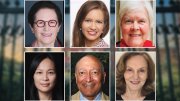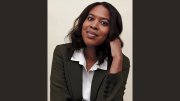The newest member of the President and Fellows of Harvard College (as the Corporation, the University's executive governing board, is formally known) is a familiar Harvard figure. Robert D. Reischauer, who was elected on October 6, is Harvardian by blood, education, marriage, and service. Son of the late University Professor Edwin O. Reischauer, the renowned scholar of Japan, Robert graduated from the College in 1963. Charlotte N. Scannell, now his spouse of 40 years, received her degree from Radcliffe the same year. (The couple have two grown children: Alyssa, a fisheries biologist, and Peter, a social worker.) Reischauer's most recent election followed by just three months the completion of his six-year term on the Board of Overseers, Harvard's other governing body.
 |
| Reischauer at Loeb House |
| Photograph by Justin Ide / Harvard News Office |
In an interview at Loeb House after the Corporation meeting on November 4, Reischauer said his experience on the Board of Overseers had been like training on "the farm team" of Harvard governance, and that having "reconnected" with the University, he had been sad to step down last June. Of the opportunity to become involved anew on the Corporation, he said, "You can be on boards like this at uninteresting times, and at interesting ones. I had the feeling this would be one of the most interesting times in Harvard's history." With new leadership, "issues can be rethought, priorities rearranged," and President Lawrence H. Summers is "clearly someone who is interested in moving the University forward." Reischauer also cited the role of new Arts and Sciences dean William C. Kirby in "reassessing the current structure of undergraduate education."
He mentioned two specific issues of personal interest: international matters and the sciences. "At a time when the world has become much smaller and international pressures and interconnections much more important in how the University positions itself for that new world," he said, "a lot of new challenges" arise. Similarly, the "revolution in life science" leads to questions about science education, the role of Harvard Medical School and the School of Public Health (where Reischauer has served on the visiting committee), and how to resolve the challenges to "best serve Harvard and society at large."
Because Corporation members are stewards of Harvard's long-term future, Reischauer was asked about a topic of professional interest: the likely effect of changing financial circumstances on Harvard, in light of sharp budget cutbacks recently announced at Dartmouth, Duke, Stanford, and elsewhere. He has had two pertinent experiences as a senior manager in the nonprofit world on which to draw for guidance. As noted, he has in the past helped run, and now leads, the Urban Institute. And in directing the Congressional Budget Office staff, he was responsible both for its operations and, more importantly, for oversight of and recommendations on the federal budget for Congress (where his CBO directorship overlapped part of the Treasury Department service of fellow Corporation members Robert E. Rubin '60, LL.D. '01, and President Summers).
Reischauer's characteristic comment on the fisc of the United Statesspeaking of a large nonprofit "organization"in his thirty-fifth-reunion report provides useful insight both on how much the country's circumstances have changed since 1998, and on the big-picture perspective he will bring to the Corporation. "The budget deficit, which has restrained policy for over a decade and a half," he wrote then, "has been reduced to manageable levels and surpluses could emerge in the next few years. The economy, with low unemployment and inflation, moderate growth, and no significant structural imbalances, is in better shape than at any time in the past few decades. Now is the time," he urged classmates, "to do something meaningful about the continuing inequality of opportunity that faces racial and ethnic minorities, the yawning income disparities that have developed over the past two decades, and the problems that will emerge when the large baby boom generation begins to draw its Social Security and Medicare benefits."
Of the immediate situation, Reischauer said the booming late 1990s and stock-market bubble "were unreal times, and Harvard managed itself prudently during the period of euphoria." Of criticisms then that Harvard lagged in investing the bounty from its burgeoning endowment in academic programs, he said, "I thought Harvard was doing the appropriate thing, which is budgeting for the long term." In managing the University's assets to avoid cycles of feast or famine, he said, "Many in the community will be grateful that Harvard increased its payout during this period moderately but not excessively, so any period of retrenchment will be moderate."
Clearly, he would not be surprised by some retrenchment. Leaner times encourage an organization to "assess where efficiencies can be realized and to carefully weigh the competing priorities that those in the University community have." In such a complex community, he said, "politics with a small 'p' and the desire to avoid conflict and contention can play a larger role than they should in an optimal sense. I don't think a bit of adversity now and then is a terrible thing in a nonprofit organization" pursuing many goals. "The easy times are over, and Larry Summers is a careful decision maker and good at rethinking how priorities will be set, as would be the case with any new president."
What about more transparency in reporting the University's financial situation and decision-making processes? (Though most of the current public debate focuses on corporate accounting, questions have been raised about the tenure process, investment decisions by Harvard Management Company, and the Corporation's veil of privacy.)
"I am clearly an advocate of transparency," Reischauer said, even as he maintained that "the degree to which that can be realized in an environment like Harvard's is limited somewhat." He noted that a first step is assuring "the information, data, and analysis that the University uses are accurate and appropriate." He said he assumed the incoming financial vice president, when appointed, will likely worry about such matters.
In a recent interview with Resource, Harvard's staff newspaper, President Summers spoke of "keeping financial records in a consistent way in all the schools." And in his introductory letter to the University's annual financial report (see "Tighter Times"), he wrote of an effort led by the provost to engage "each faculty in an effort aimed at strengthening their budgeting...processes." Presumably, one of the payoffs from new University financial-information systems will be more timely and coherent reports for the institution as a whole, and more consistent, complete income statements and balance sheets for the individual schools. In materials released last fall for the beginning of its fundraising effort, the Business School moved toward a bit more public disclosure of its revenues (see "Capitalism Campaign," November-December 2002, page 55). Should society or Harvard's supporters demand clearer or more comprehensive reporting from this nonprofit institution, it seems, the tools to do so are being put in place.
On matters like these, Reischauer will clearly have a good deal to say. Overall, he has found "the scope of the issues the University deals with daily and monthly rewarding." Having apprenticed as an Overseer, he said, he felt that in these "interesting times" he "had learned enough about the workings of the University now to be of some use."





